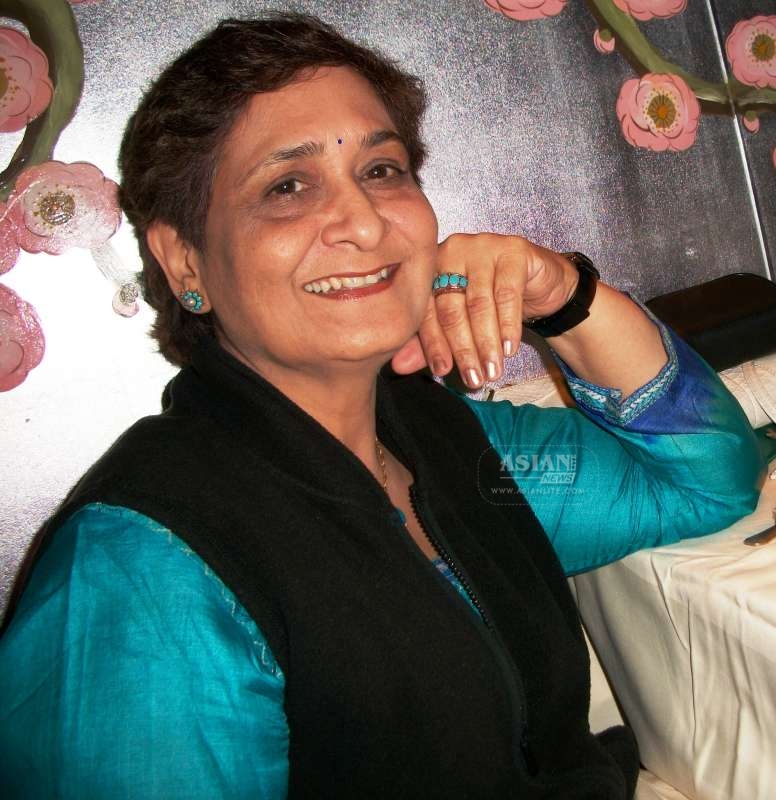Founder president of Vatayan: Poetry on South Bank organisation and Fellow of the Royal Society of Arts, Divya Mathur, inspires many with her work and attitude towards life. The multi-talented senior programme director of The Nehru Centre, London, firmly believes that before changing and educating the men, women themselves have to change..writes Anjana Parikh
AL: Tell us about your journey from Delhi to Denmark to London?

Divya: Rescued from a bad marriage by a bosom friend, who got me flown to Denmark in 1985 with my son. When I could not find any job there, I landed in London. After a huge struggle, I found a job at the High Commission of India, London, as a contingency clerk; beggars can’t be choosers. Having received a diploma in Medical journalism from the Institute of Journalism in Delhi, I did a correspondence course in journalism from Glasgow to compare the two.
AL: You’re a multi-talented person. How do you divide your energy, time and intellect to multi-task?
Divya: When the kids were little, I wanted to set an example to them. Being a single parent, I worked round the clock doing all sorts of jobs; to make two ends meet, managed to give them good and all-round education. Now, that they are well educated professionals, I have all the time in the world to enjoy life and I enjoy it by working hard. I am a hard taskmaster, who doesn’t like to waste a moment. Besides, I am a workaholic, who wants to handle two or three tasks at one go.
AL: What were the initial hurdles for you in a new country?
Divya: I found living in this country far easier than India; where I could not survive. To have let one’s husband in those days was a taboo. When I arrived in this country, I was a very meek person so it took longer than anyone else in my situation to get a foothold. I am writing my autobiography now which will give you a good idea what a woman goes through in the man’s world.
AL: You were chosen by Dr Gopal Krishna Gandhi (Ghandiji’s grandson) to establish Nehru Centre in London. You must be quite chuffed?
Divya:I must say that it took a Gandhi to lift me out of the doldrums I was in. All of a sudden I found myself at The Nehru Centre doing a decent job I could never have imagined, earning good wages. I still wonder why he chose me! Must be my dedication and hard work he had witnessed at India House! I can’t count my blessings; that is why I gave one hundred percent to my job, always.
AL: You’re also well-known for your organisational skills. What are the tools and techniques to enhance this skill?
Divya: I am not a trained impresario but I hide my shortcomings behind my diligent work. I have learnt over the last 25 years that nothing is impossible; you just need a little creativity and a lot of hard work. Doing the background work is essential to get the best results.
AL: You’ve been honoured with several awards including Arts Achiever of the Arts Council of England and Dr Harivansh Rai Bachchan Literary Award of the High Commission of India, London, etc. What do these honours mean to you?
Divya: Being loved and respected by friends, family and everyone, is more important to me than any award but getting an award confirms that I have really accomplished something. Each award makes me more humble, thinking that I don’t really deserve it, may be there are people who deserved it more.
AL: You’ve authored over a dozen of story and poetry collections and have also edited three anthologies of short stories by Indian Women Settled Abroad. Why do your anthologies include mostly stories by women?
Divya: One reason is that women’s achievements are never purely personal. Also, we continue to work phenomenally harder than men to qualify for equal recognition in many walks of life. In this day and age, women are still subjected to prejudice, violence, poorer resources and lower wages. The workplace can still feel like a man’s world. Like all big social movements, feminism has run into problems, yet the campaign for the rights of women must go on.
AL: You’ve been listed in the volumes of Great Women of the 21st Century and Inspirational Women, to name a few. Where do you get your inspiration from?
Divya: For a woman, it is doubly hard to achieve anything and that is why I am inspired by each and every woman who has achieved even a little success. I do what I do without expecting any rewards but when I get honoured, the happiness is doubled.
AL: Even after hundreds of years, women are still fighting for their rights; violence against women hasn’t stopped. Your view on this
Divya: It will need a minimum of 25 pages to explain but in a nutshell, before changing and educating the men, women themselves have to change.
AL: Many Asian women leave their career after marriage as most of them do not get the support from their new family. What can be done to solve the issue?
Divya: In my days, working after marriage was not considered respectable, but, then, there was a time when working girls were preferred; specially teachers. These days, fewer women leave jobs after marriage. The world is their oyster for women in this country as they have a choice and most husbands and in-laws understand their work demand. Even in India, times have changed, may be not in villages but they are also evolving.